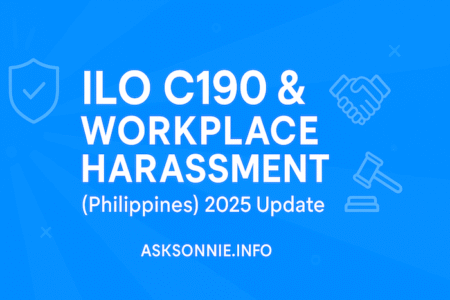ILO C190 & Workplace Harassment in the Philippines (2025 Update)
In 2025, harassment no longer hides behind office walls — it shows up in chats, meetings, and digital workspaces. Whether you’re a leader shaping culture or an employee protecting dignity, understanding harassment, bullying and discrimination is essential to creating safe, values-aligned workplaces in the Philippines.

🧩 Understanding the Difference: Harassment, Bullying & Discrimination
These terms are often interchanged but have distinct meanings and legal bases.
Workplace Harassment
Unwelcome or unsolicited behavior that a reasonable person would find offensive, intimidating, humiliating, or threatening. Anchored on protected characteristics such as gender, religion, age, disability, or national origin. Covered by laws like:
- RA 7877 – Anti-Sexual Harassment Act (1995)
- RA 11313 – Safe Spaces Act (2019) — expands protection to online and gender-based settings.
Workplace Bullying
Repeated, health-harming mistreatment of an employee — cyber abuse, verbal insults, offensive conduct, or deliberate work interference.
- Legal status: no specific Philippine law yet.
- Anti-Bullying Act (RA 10627) applies only to schools.
- Proposed House Bill 815 and Senate Bill 1217 aim to cover workplaces.
Workplace Discrimination
Unfair or prejudicial treatment based on protected traits — gender, disability, religion, age, or health condition. Addressed by multiple statutes ensuring equality and fair labor practice.
⚖️ The Philippine Legal Framework (Updated 2025)
The following laws and policies collectively form the Philippines’ comprehensive framework against workplace harassment, bullying, and discrimination as of 2025:
| Category | Key Law / Policy | Coverage |
|---|---|---|
| Sexual Harassment | RA 7877 – Anti-Sexual Harassment Act | Unwanted sexual conduct in work, education, or training |
| Gender-Based Harassment | RA 11313 – Safe Spaces Act | Protection in workplaces, public, and online spaces |
| Women’s Rights & Workplace Equality | RA 6725, RA 9710 – Magna Carta of Women, Labor Code Arts. 135–138 | Bans discrimination vs. women in hiring, pay, promotion, and benefits |
| Age Discrimination | RA 10911 – Anti-Age Discrimination in Employment | Prohibits age bias in recruitment and employment decisions |
| Disability Rights (PWDs) | RA 7277 – Magna Carta for Persons with Disability | Non-discrimination and reasonable accommodation |
| Solo Parents | RA 8972 – Solo Parents Welfare Act | Protects against workplace bias; provides flexible work benefits |
| Indigenous Peoples | RA 8371 – Indigenous Peoples’ Rights Act | Prohibits cultural/ethnic discrimination; respects IP identity/heritage |
| Cyber Harassment | RA 10175 – Cybercrime Prevention Act | Online libel, stalking, identity-based digital threats |
| Photo & Voyeurism | RA 9995 – Anti-Photo and Voyeurism Act | Bans unauthorized capture/sharing of intimate images |
| Mental Health | RA 11036 – Mental Health Act | Prevents discrimination tied to mental health conditions |
| HIV Status | RA 11166 – HIV and AIDS Policy Act | Confidentiality and non-discrimination for PLHIV |
| Health Conditions | DOLE DO 73-05 (TB), DO 05-10 (Hepatitis B), DO 53-03 (1st-time substance use) | Bans discrimination vs. TB/HepB; due-process for substance cases |
| COVID-19 Related | RA 11494 – Bayanihan II, RA 11525 – Vaccination Program Act | Protects against discrimination tied to infection or vaccination status |
| Serious Insult / Inhumane Treatment | Labor Code Art. 300 (formerly 285) | Just cause to resign due to serious insult/abuse |
🌏 ILO C190: A Landmark Step Toward Ending Workplace Harassment
The International Labour Organization (ILO) Convention 190 sets global standards for eliminating violence and harassment in the world of work. Adopted on June 21, 2019, it defines every worker’s right to a world of work free from violence, abuse and intimidation — including gender-based and digital forms.
Philippine Ratification and Next Steps
The Philippines ratified ILO C190 on February 20, 2024, becoming the first Asian country to do so (see Senate Resolution No. 877). Following ratification, the Department of Labor and Employment (DOLE) and tripartite partners are developing the Implementing Rules and Regulations (IRR) to align with RA 7877 and the Safe Spaces Act (RA 11313).
🌍 Global Standards Set by ILO C190 (Learn more)
ILO C190 establishes a universal benchmark for dignity and safety at work. It requires member countries — including the Philippines — to align national laws, company policies, and labor practices with these core global standards:
1️⃣ Inclusive Protection
Every person in the world of work — regardless of status or sector — has the right to be free from violence and harassment.
- Regular, contractual, part-time, or probationary workers
- Interns, trainees, job applicants, volunteers
- Informal, gig, and digital-platform workers
- Clients, customers, and third parties
2️⃣ Comprehensive Definition
“Violence and harassment” include physical, psychological, sexual, or economic harm — not just overt acts. This ensures laws cover modern issues like:
- Cyberbullying, doxxing, and online stalking
- Gender-based slurs and intimidation
- Emotional or mental abuse
- Retaliation against complainants
3️⃣ Employer Accountability
Employers must prevent, identify, and address violence and harassment through:
- Clear workplace policies and codes of conduct
- Risk assessment and safety measures
- Confidential reporting and anti-retaliation protections
- Education and awareness training
4️⃣ State Obligation
Governments must legislate and enforce protective laws, provide accessible remedies, and promote safe-work campaigns.
For the Philippines, that includes strengthening:
- DOLE’s regulatory guidelines and enforcement
- CHR and PCW referral systems
- Inter-agency coordination on labor and gender rights
5️⃣ Integration of Gender Perspective
Policies must explicitly address gender-based violence and discrimination, aligning ILO C190 with:
- CEDAW (Convention on the Elimination of All Forms of Discrimination Against Women)
- UN Sustainable Development Goal 5 (Gender Equality)
6️⃣ Right to Remedies and Support
Workers must have access to confidential complaint mechanisms, legal redress, and psychosocial support.
In the Philippines, this reinforces synergy among:
- Safe Spaces Act (RA 11313)
- Anti-Sexual Harassment Act (RA 7877)
- Mental Health Act (RA 11036)
✅ Bottom line: ILO C190 unifies local and international principles under one commitment —
“A world of work free from violence and harassment — grounded in dignity, equality, and respect.”
What Ratification Means for Employers and Workers
- Unified Standards: Integrates international definitions of violence and harassment into Philippine labor law.
- Expanded Protection: Covers all workers — formal, informal, contractual and digital.
- Stronger Accountability: Requires companies to implement prevention measures and anti-retaliation policies.
- Policy Alignment: Encourages HR leaders to review codes of conduct and grievance procedures in anticipation of the IRR.
🧠 Elements of Workplace Bullying, Harassment or Discrimination
- Use of Power — formal authority or informal influence.
- Intention to Control — manipulating others for non-work objectives.
- Personal Dislike vs Behavior Correction — attacking identity ≠ discipline.
- Personal Attacks — age, gender, faith, disability or appearance.
- Specific Objective — to get ahead, get rid of, or shift blame.
👥 Who Are the Likely Instigators?
- Supervisors / Managers — abuse authority to humiliate or control.
- Subordinates — “upward bullying” of new or reformist leaders.
- Tenured Employees — resist change or use influence to intimidate.
- Peers / Any Employee — rivalry or insecurity trigger exclusion.
⚠️ Likely Acts of a Workplace Harasser
- Verbal abuse — public shaming or sarcasm.
- Cyber-bullying — online defamation (RA 10175).
- “Peters’ Principle” ploy — assigning impossible tasks.
- Sabotage — withholding data or spreading rumors.
- Unfavorable assignment — punitive rotation or scheduling.
- Sexual harassment — see RA 7877 & RA 11313.
- Threats / blackmail — coercion by fear.
- Indirect insubordination / exclusion — team boycott.
- Exploiting newcomers / interns — hazing behavior.
- Cancel culture — organized ostracism.
- Any form of discrimination — age, gender, religion or disability bias (RA 10911; RA 9710).
🧩 How to Handle Workplace Bullying or Harassment
1️⃣ Stay Calm
Pause and assess; avoid reactive responses that can be used against you.
2️⃣ Call Out or Go Head-On — But Prepare First
Eight Things to Do Beforehand
- Keep an audit trail of tasks.
- Save screenshots and messages.
- Perform well to protect credibility.
- Be punctual.
- Respect privileges.
- Control your reaction.
- Know company policies.
- Know the law — RA 7877, RA 11313, RA 10175, Labor Code Art. 300.
After due diligence, present your documented case to HR or upper management. If internal channels fail, escalate to DOLE, CHR, or PCW.
🏛️ What HR and Employers Can Do
- Define harassment and bullying clearly in your Code of Conduct.
- Align with ILO C190 and DOLE Safe Workplace Guidelines.
- Promote safe-space culture through core-values and Safe Spaces training (RA 11313).
- Train managers on positive discipline and coaching.
- Provide confidential reporting channels.
- Ensure fair investigation using neutral panels.
- Run pulse checks and feedback loops.
- Hold “coffee talks” with likely bullies to open dialogue.
- For due process, see Preventive Suspension: When and How to Use It.
💡 The ASK Framework for Safe and Respectful Workplaces
ALIGN — with truth, fairness and compassion.
STRENGTHEN — awareness and accountability through policy and training.
KICKSTART — systems that address issues promptly and restore dignity.
A safe workplace protects by law and thrives by values.
❓ Frequently Asked Questions (2025)
💬 What is ILO C190 in a nutshell — and what’s in it for me?
ILO C190 is a global treaty by the International Labour Organization that guarantees your right to a workplace free from violence, bullying, and discrimination.
For employees, it means stronger protection and clear remedies if you experience harassment. For employers, it requires proactive policies, training, and safe reporting systems aligned with global best practices.
Has ILO C190 been ratified in the Philippines?
✅ Yes. The Philippines ratified ILO C190 on February 20, 2024 — becoming the first Asian country to do so. DOLE is crafting the Implementing Rules and Regulations (IRR) with tripartite partners.
Is there a specific law against workplace bullying?
🚫 Not yet. The Anti-Bullying Act (RA 10627) applies only to schools. Pending House Bill 815 and Senate Bill 1217 aim to cover workplaces. Employees may invoke RA 7877, RA 11313, or Labor Code Art. 300 for related abuses.
What laws protect employees from discrimination?
How do I report harassment if HR is involved?
Escalate to management or external agencies such as DOLE, CHR, or PCW. Keep all documentation and evidence.
Are online messages covered by harassment laws?
✅ Yes. The Safe Spaces Act (RA 11313) and Cybercrime Law (RA 10175) penalize digital harassment and identity-based threats.
What’s HR’s role in prevention?
HR must lead implementation of anti-harassment policies, Safe Spaces training, and fair, confidential case handling.





